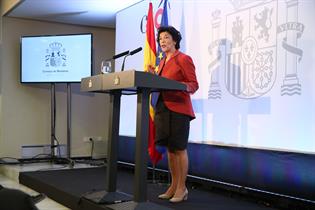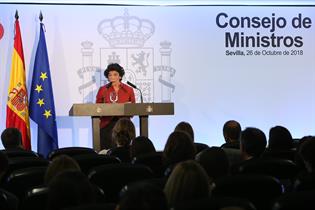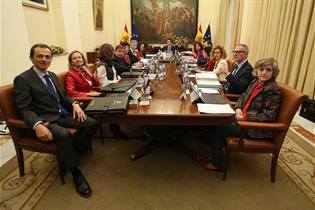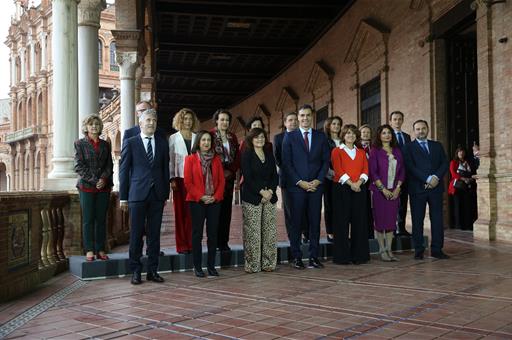Council of Ministers
Government lodges appeal against Resolution of Regional Parliament of Catalonia on the monarchy out of a "sense of State"
Council of Ministers - 2018.10.26
Government Delegation in Andalucía, Sevilla
The Council of Ministers, which met for the first time in Seville, decided to lodge an appeal before the Constitutional Court against the Resolution of 11 October of the Regional Parliament of Catalonia which rejected the speech by King Felipe VI on the "Catalan conflict" and advocated the abolition of the monarchy.
The Minister for Education and Vocational Training, and Government Spokesperson, Isabel Celaá, recalled that last Friday the government asked for an opinion from the Council of State - the top government advisory body - on this challenge, a report which is "mandatory, but not binding". In its report, the Council of State concluded that this Resolution adopted by the Regional Parliament of Catalonia does not constitute "a suitable object to be challenged" before the Constitutional Court. The government, claimed Isabel Celaá, whilst respecting the opinion of the Council of State, does not share its legal argument, and hence will appeal against this Resolution "out of a sense of State".
The Government Spokesperson explained that the Council of State stated that the Resolution of 11 October is "a serious attack on the principle of institutional loyalty and a political statement that clearly degrades the political form of the Spanish State and the democratic principles enshrined in the Spanish Constitution", but considers that these parliamentary motions "are of a purely political and not a legal nature".
However, remarked Isabel Celaá, the government considers that the Resolution is unconstitutional, and represents an attempt by the Regional Parliament of Catalonia to "initiate a unilateral process that leads to a hypothetical republic, which clearly violates the Constitution and contravenes recent doctrine and case law of the Constitutional Court".
Furthermore, the government believes that the attempt to abolish the monarchy and the attack on the figure of the King "and the Council of State declared the same, goes beyond the powers conferred on the Regional Parliament of Catalonia", which violates both the Spanish Constitution and the Statute of Autonomy of Catalonia.
Attention for foreign minors
 Pool Moncloa/Fernando CalvoThe Council of Ministers approved a Royal Decree to provide 40 million euros of financing to the autonomous regions and autonomous cities of Ceuta and Melilla to defray the expenses for attention for unaccompanied foreign minors taken in over the course of 2018, and, if necessary, pay for their transfer to other regions.
Pool Moncloa/Fernando CalvoThe Council of Ministers approved a Royal Decree to provide 40 million euros of financing to the autonomous regions and autonomous cities of Ceuta and Melilla to defray the expenses for attention for unaccompanied foreign minors taken in over the course of 2018, and, if necessary, pay for their transfer to other regions.
The Government Spokesperson pointed out that the number of arrivals of minors has increased in recent months, and hence, the government responds on grounds of public, social and humanitarian interest, and has structured this aid for those autonomous regions and cities that request it. The scope of application runs from 31 December 2017 to 30 September 2018.
Isabel Celaá specified that out of the 40 million euros, 38 million will be proportionally distributed according to the number of unaccompanied minors that each regional authority has taken in. The other 2 million euros will be reserved to covers the costs deriving from attention for minors in regions that suffer from a seasonal increase as from September.
Ban on inflatable and semi-rigid speedboats
The government approved a Royal Decree-Law banning high-speed vessels throughout the country, known as 'narcolanchas' [speedboats used for drug trafficking]. This type of vessel is used by the mafias to smuggle merchandise and, in recent months, have also been used for people trafficking.
Isabel Celaá argued that, given the urgency and the gravity of the problem, the government has decided to replace the draft bill amending the Constitutional Law to Counter Smuggling presented back in July with this Royal Decree-Law.
The legislation affects inflatable and semi-rigid high-speed vessels with a length in excess of eight metres, and shorter vessels that have a maximum power equal to or greater than 150 kilowatts, and any other vessel, regardless of its size of power, if there are signs that it could be used to commit smuggling offences.
The minister clarified that the creation of the Special Register of Operators of Inflatable and Semi-rigid High-speed Vessels will be maintained, and that vessels assigned to national defence and maritime rescue, among others, will be exempt from this ban, following prior authorisation and their inclusion in the Register.
Storm aid
 Pool Moncloa/Fernando CalvoThe government studied a report on the consequences of the latest torrential rainfall concentrated in the regions of the Spanish Levant, Catalonia, Aragon and Andalusia.
Pool Moncloa/Fernando CalvoThe government studied a report on the consequences of the latest torrential rainfall concentrated in the regions of the Spanish Levant, Catalonia, Aragon and Andalusia.
Isabel Celaá announced that the gold class Medal of Merit for Civil Protection with a red ribbon will be granted to the fireman José Gil Gutiérrez, who died last week on active service while trying to help people affected by the storms.
The Government Spokesperson explained that the government, after analysing all the information presented by regional and local authorities, took the first steps towards ensuring that those affected receive the aid necessary to attend to their immediate needs. It is also studying whether to declare the zones affected as disaster zones. This declaration would facilitate the provision of extraordinary aid to those affected.
The government also thanked all those people who helped repair the damage caused, particularly those volunteers whose efforts exceeded all expectations.
New vineyards
The Government Spokesperson reported that the Council of Ministers approved a new regulation to improve the procedure to grant authorisations for new vineyards and to give priority to young wine-growers and researchers.
Isabel Celaá recalled that Spain has almost 1 million hectares of vines, a similar figure to Italy and France, and hence the government wants to be ready and prepared to incorporate EU Directives.
Entrepreneurs and research
The government agreed to allocate almost 100 million euros to finance close on 500 innovative business projects set up by SMEs, technology companies and young entrepreneurs.
On another note, the Council of Ministers authorised the State Research Agency to put out a call for proposals for 265 subsidies for a total sum of 19 million euros to recruit doctors and to train researchers in companies.
Transposition of Offshore Directive
The Council of Ministers approved a Royal Decree that completes the transposition of the Offshore Directive to the Spanish legal system on the safety of offshore gas and oil operations. This regulation, in turn, develops another Royal Decree, ratified by the Lower House, in which provisions are established on safety in research and the exploitation of hydrocarbons in the marine environment, stated Isabel Celaá.
Job creation
 Pool Moncloa/Fernando CalvoWhen taking stock of the week, Isabel Celaá highlighted the visit by the President of the Government, Pedro Sánchez, to the Renault Group factory in Valladolid, an example of the government's commitment to this sector, which employs some 250,000 people in Spain, and to its transformation into an industry "that is less aggressive with the environment".
Pool Moncloa/Fernando CalvoWhen taking stock of the week, Isabel Celaá highlighted the visit by the President of the Government, Pedro Sánchez, to the Renault Group factory in Valladolid, an example of the government's commitment to this sector, which employs some 250,000 people in Spain, and to its transformation into an industry "that is less aggressive with the environment".
At an economic level, the Minister for Education and Vocational Training highlighted that in the third quarter of the year, the unemployment rate has dropped below 15%, something not seen since 2008, according to the latest Labour Force Survey. The Spanish economy has now enjoyed four straight years of "mass job creation", stressed Isabel Celaá.
Non official translation





